#difference between HTTP vs HTTPS
Explore tagged Tumblr posts
Text
Max and Lewis at the post-race press conference
#my post#max verstappen#lewis hamilton#4433#via https://twitter.com/4433thinker/status/1815094174569648420#now why was the vibe so different between this vs the conf lmao#im so tired
253 notes
·
View notes
Text
What’s wrong with tariffs

I'm on a 20+ city book tour for my new novel PICKS AND SHOVELS. Catch me in CHICAGO TONIGHT (Apr 2) with PETER SAGAL, and in BLOOMINGTON on FRIDAY (Apr 4). More tour dates here.

It's not that the Republicans and the Democrats are the same…obviously. But for decades – since Clinton – the Dems have sided with neoliberal economics, just like their Republican counterparts, so the major differences between the two related to overt discrimination, to the exclusion of the economic policies that immiserated working people, with the worst effects landing on racial minorities, women, and gender minorities.
So the Dems stood against discrimination in mortgage lending – but not for the minimum wage that would have lifted the lowest paid workers out of poverty so the could afford a mortgage. They stood for abortion rights, but against Medicare For All, which meant all women had the right to an abortion, but the poorest women couldn't afford one. And of course, in a country where racial and gender discrimination were still the order of the day, the poorest and most vulnerable Americans were racialized, women, disabled, and/or queer.
The Dems' embrace of Reaganomics meant that working people of all types experienced steady decline over 40 years: stagnating wages, economic precarity, increased indebtedness, and rising prices for health care, education, and housing. When Trump figured out that he could campaign on these issues, Dems had no response. Trump's "Make America Great Again" was meant to appeal to a time when working Americans were – on average, depending on their whiteness, maleness and straightness – better housed, better paid, and better cared for.
Of course, those benefits were unevenly felt: America was slow to extend the New Deal to racial minorities, women, disabled people, and other disfavored groups. Trump's genius was to marry white supremacy to economic grievance, tricking white workers into blaming their decline on women, brown and Black people, and queers – and not on the billionaires who had grown so much richer even as workers got poorer.
But Trump couldn't have pulled this trick off without the Dem establishment's total unwillingness to confront the hollowness of their economic policies. From Pelosi's "We're capitalists and that's the way it is" to Hillary Clinton's catastrophic campaign slogan, "America is already great," the Dems' answer to workers' fear and anger was, "You are wrong, everything is fine." Imagine having had your house stolen in the foreclosure crisis after Obama decided to "foam the runways" for the banks by letting them steal their borrowers' homes and then hearing Hillary Clinton tell you "America is already great":
https://www.npr.org/2014/05/25/315276441/its-geithner-vs-warren-in-battle-of-the-bailout
Racial and gender justice matter, of course, but when they're pursued without considering economic justice, they're dead ends. The point of racial and gender justice can't merely be firing half of the 150 straight white men who control 99% of the country's capital and replacing them with 75 assorted women, queers and people of color. The worst-treated workers in America are also its most discriminated-against workers, so the best way to help women, racialized people, and other disfavored minorities is to help workers: protect unions, raise the minimum wage, defend tenants, cancel student debt, and give everyone healthcare. In the same way that a special tax on incomes over $1m will disproportionately affect straight white men, an increase in the minimum wage will disproportionately benefit women and people of color – as well as the majority of straight white men who are also getting fucked over by people with $1m salaries.
Since the Clinton years, Democrats have been trying to figure out how to defend economic policies that help rich people while still somehow being the party of social justice. This has produced a kind of grotesque, Sheryl Sandberg "Lean In" liberalism, which stood for the rights of women who were also corporate executives. It's not that these women aren't treated worse than their male counterparts – misogyny is alive and well in the boardroom. But the number of women who experience boardroom discrimination is tiny, because the number of women in the boardroom is also tiny.
The right saw and opportunity and seized it. As Naomi Klein writes in Doppelganger, they created "mirror world" versions of social justice issues, warped reflections of the leftist positions that had been abandoned by a progressive coalition led by liberals:
https://pluralistic.net/2023/09/05/not-that-naomi/#if-the-naomi-be-klein-youre-doing-just-fine
In right wing, conspiratorial hands, rage at wage stagnation and lack of parental leave turned into reactionary demands for an economy in which women would be full-time homemakers while their husbands recovered their roles as breadwinners. The 1999 Battle of Seattle saw mass protests over the WTO and a free trade agenda that would let capital chase low wages and weak environmental and worker safety policies around the world. But Clinton went ahead and signed more free trade agreements, which were also pursued by Obama. So the right filled the vacuum with a mirror-world version of the Battle of Seattle's rage at billionaires, transforming the anti-free trade agenda into racism, xenophobia, and Cold War 2.0 sinophobia.
It's a cheap trick, but Dems keep falling for it. When the right declares itself to be against something, Dems can be relied upon to be in favor it, no matter how reactionary, anti-worker and authoritarian "it" is. During Trump 1.0, Dems lit James Comey votive candles and passionately defended the "intelligence community," a community that gave us CIA dirty wars and FBI COINTELPRO. Anthropologists call this "schizmogenesis" – when a group defines itself by valuing whatever its rivals deplore, and vice versa:
https://pluralistic.net/2021/12/18/schizmogenesis/
You can see schizmogenesis playing out right now, as "progressives" make Signalgate scandal into a fight over poor operational security (planning a war crime using a commercial app) and not a fight over war crimes themselves.
Signalgate will be out of the headlines in a matter of days, though – unlike tariffs, which will continue to make global headlines throughout the Trump presidency, as Trump continues his "mad king" policy of recklessly and chaotically erecting trade barriers that are certain to make supply chains more brittle and raise prices.
For the most part, the progressive discussion of Trump's tariffs takes the position that tariffs are always a terrible idea – in other words, that Clinton and Obama had the right idea when they created free trade agreements with countries around the world, and Trump is vandalizing an engine of American and global prosperity out of economic ignorance.
Economists support this analysis. But in a new, well-argued editorial in The Sling, University of Utah economists Mark Glick and Gabriel Lozada present a more nuanced version of the tariff debate, one that dodges the trap of neoliberal economics and schizmogenesis:
https://www.thesling.org/the-failed-assumptions-of-free-trade/
Rejecting tariffs is practically an article of religious faith among economists. As the NYT put it in their reporting of the 2025 meeting of the American Economic Association, "free trade is perhaps the closest thing to a universally held value among economists":
https://www.nytimes.com/2025/01/10/business/economy/economists-politics-trump.html
Every Econ 101 class has a unit on David Ricardo's "theory of comparative advantage," which argues that different countries have different capacities and specialties, and that free trade allows these advantages to be shared to the benefit of everyone, making trade a "positive expectation" game. The corollary is that tariffs make everyone worse off.
As Glick and Lozada write, the logic of this argument is unassailable, provided you accept its bedrock assumptions as true – and that's where the problem lies.
Economics has an assumptions problem. The foundational method of economic practice is to create models grounded in assumptions that are either not known, not knowable, or – incredibly – known to be wrong. As Milton Friedman famously wrote:
Truly important and significant hypotheses will be found to have "assumptions" that are wildly inaccurate descriptive representations of reality, and, in general, the more significant the theory, the more unrealistic the assumptions (in this sense)
https://pluralistic.net/2025/02/17/caliper-ai/#racism-machine
It's actually worse than it seems, because economics, as a field, has been violently allergic to empirically testing its assumptions, so it doesn't even know when it is operating on the basis of one of Friedman's "wildly inaccurate descriptive representations of reality." This is what Ely Devons meant when he said, "If economists wished to study the horse, they wouldn’t go and look at horses. They’d sit in their studies and say to themselves, ‘What would I do if I were a horse?’"
https://pluralistic.net/2022/10/27/economism/#what-would-i-do-if-i-were-a-horse
What are the assumptions that underpin the orthodox view of free trade, then? As Glick and Lozada write, the case against all tariffs depends on five assumptions, all of which fail empirical investigation.
I. Full employment
The standard model of free trade assumes full employment – "when workers are displaced by imports, they can easily become re-employed at the same wages." This is the crux of the "social surplus" that free trade theoretically produces. This assumption doesn't hold up to empirical scrutiny. After the US dropped its tariffs, it experienced a 74% decline in manufacturing jobs – the best-paid jobs for non-college-educated men. Those workers didn't find equivalent employment – indeed, in many cases, the found no employment at all. From 2001-18, the US lost 1.132m manufacturing jobs to China, and gained 0.176m jobs manufacturing goods for export to China.
II. No externalities
The employment losses from free trade are not evenly distributed – they are geographically concentrated, and the greatest concentrations are in regions that flipped from Democratic strongholds to Trumpish heartlands over the decades since the US dropped its tariffs. The losses to these regions aren't limited to the directly affected manufacturing jobs, but all the other economic activity those jobs supported. The people who sold groceries, cars, and furniture to factory workers also lost their jobs. When young people abandoned the cratering regional economy, that devastated education and other services catering to families.
III. Comparative advantage leads to long-term growth and development
The theory of comparative advantage says that the world is better off when each country gets to do the thing it's best at. What are poor countries best at? Being poor: having a cheap labor force and weak rule of law to protect workers' health and the environment.
Without exception, the poor countries that grew richer did so in the presence of tariffs: "free trade is not a development strategy, it is a static policy that can impede development":
https://2024.sci-hub.se/1864/6d3f610c51446f057a4054080c70ab0e/chang2003.pdf#navpanes=0&view=FitH
IV. Floating currencies keep trade balanced
In theory, adjustments in the currency markets will rebalance imports and exports – countries whose currency declines will have to switch to domestic production, because goods from abroad will become costly. That's not what happened. Instead, foreigners have invested the US dollars they got from selling things to Americans into US securities and real estate, "which does not increase US productivity because it generates no new capital formation (at least directly)."
V. The US provides compensation for trade-related job-losses
While other countries with robust social safety nets offered retraining, income support, and other programs to cushion the blow of trade-related job-losses, the US – with the worst social safety net in the rich world – offered "woefully inadequate" supports to dislocated workers:
https://www.piie.com/bookstore/job-loss-imports-measuring-costs
Now, just because some tariffs are beneficial, it doesn't follow that all tariffs are beneficial. When the "Asian Tiger" countries were undergoing rapid industrialization and lifting billions of people out of poverty, they did so with tariffs – but also with extensive industrial policy and direct investment in critical state industries (Biden was the first president in generations to pursue industrial policy, albeit a modest and small one, which Trump nevertheless dismantled).
Trump is doing mirror-world tariffs: tariffs without industrial policy, tariffs without social safety nets, tariffs without retraining, tariffs without any strategic underpinning. These tariffs will crash the US economy and will create calamitous effects around the world:
https://archive.is/JvRF9
But the fact that Trump's tariffs are terrible doesn't mean tariffs themselves are always and forever bad. Resist the schizmogenic urge to say, "Trump likes tariffs, so I hate them." Not all tariffs are created equal, and tariffs can be a useful tool that benefits working people.
And also: the fact that tariffs can be useful doesn't imply that only tariffs are useful. The digital age – in which US-based multinational firms rely on digital technology to loot the economies of America's trading partners – offers countries facing US tariffs a powerful retaliatory tactic that has never before been seen on this planet. America's (former) trading partners can retaliate against US tariffs by abolishing the legal measures they have instituted to protect the products of US companies from reverse-engineering and modification. Countries facing US tariffs can welcome US imports – of printers, Teslas, iPhones, games consoles, insulin pumps, ventilators and tractors – but then legalize jailbreaking these devices:
https://pluralistic.net/2025/03/08/turnabout/#is-fair-play
That would deprive the largest US companies of their recurring revenue streams – from service, consumables, software, payment processing, etc – creating huge savings for consumers all over the world, and huge profits for the non-US companies that make these jailbreaking tools, and the small businesses that supply them. For example, your country could become the world's leading exporter of iPhone jailbreaking tools, and the world's powerhouse for alternative iPhone stores that charge 1-2% commissions on payments, as opposed to the 30% Apple takes out of every dollar (euro, pound, peso) that iPhone owners spend within their apps. This would tempt in all the biggest app companies in the world – from Patreon to Tinder, Fornite to the New York Times – who could offer their products at a discount and still make more money than they make on Apple's App Store.
But that's just one market this enables: the actual business of iPhone jailbreaking would likely work much like the market for phone unlocking more broadly: thousands of small and medium-sized businesses like dry-cleaners and convenience stores where you can bring your phone and pay a few dollars to have it unlocked and set up with a new app store where all the apps are the same – but everything is 20% cheaper.
This is a development opportunity without parallel. US tech monopolists worked with the US trade representative to rig markets around the world, allowing tech giants to siphon away vast fortunes from America's trading partners. These rich deposits of wealth are just sitting there, begging for some country to sink a shaft into them and pump them dry, secure in the knowledge that Trump has ejected from the global system of free trade and they have nothing to lose.

If you'd like an essay-formatted version of this post to read or share, here's a link to it on pluralistic.net, my surveillance-free, ad-free, tracker-free blog:
https://pluralistic.net/2025/04/02/me-or-your-lying-eyes/#spherical-cows-on-frictionless-surfaces
#pluralistic#economism#doppelganger#economics#free trade#tariffs#trumpism#anticircumvention#move fast and break kings#socialism of fools
477 notes
·
View notes
Note
https://www.tumblr.com/brainddeadd/776510486561882112/quinn-and-luke-watching-jack-fall-in-love-the
oooo maybe something similar to this but for quinn?
Quinn and Jack Watching Luke Fall in Love
Quinn and Luke watching Jack fall in love

Jack and Luke watching Quinn fall in love
Scene 1: The Hughes Group Chat Exposes Everything
Quinn is usually the one who responds last in their group chat. Between games, travel, and his general avoidance of Jack and Luke’s nonsense, his replies are minimal—until lately.
Jack notices first.
Luke: Bro, why are you actually texting back in real time?
Jack: Yeah, don’t you usually leave us on read for like, five hours?
Quinn doesn’t reply right away, but Luke sees the typing bubble appear and disappear before a single message pops up.
Quinn: Shut up.
Jack smirks, instantly suspicious.
Jack: Ohhh, no. What’s going on in Vancouver?
Luke: Are you… happy?
Jack: Bro, he’s in love.
Quinn goes offline after that, but Jack and Luke have seen enough. They don’t need him to confirm it—they know.
---
Scene 2: The Devils vs. Canucks Game Where Jack and Luke Find Out
The second Quinn steps onto the ice for warmups, Jack and Luke are watching him like hawks.
“You think she’s here?” Luke asks, nudging Jack.
Jack tilts his head, studying Quinn. He’s focused—but there’s something different about the way he keeps glancing up at the stands. Then Jack sees it.
Quinn’s gaze lands on a woman standing near the tunnel, wearing a Canucks hoodie that looks a little too oversized—probably Quinn’s.
Jack grins. “Oh, that’s her.”
Luke follows his line of sight and smirks. “Yep. He’s toast.”
During the game, Quinn plays with his usual intensity, but Jack notices the way he straightens up whenever he skates past her side of the rink. When he gets an assist, he sneaks a glance toward the stands, and sure enough—there she is, clapping.
Jack skates past Luke on the bench and nudges him. “He’s showing off.”
Luke snorts. “Definitely.”
After the game, when Quinn tries to make a quick exit, Jack and Luke are waiting outside the locker room. When they spot him walking toward her, Jack calls out, loud enough for her to hear.
“Hey, Y/N! We’ve heard so much about you!”
Quinn groans, shooting them a glare as you laugh. “They’re lying,” he mumbles.
But the damage is done—Jack and Luke are in, and they’re never letting Quinn live this down.
---
Scene 3: The Family Trip Where It Becomes Official
The Hughes family always tries to spend time together during the offseason, which is how Jack and Luke finally get the chance to see Quinn with you outside of a hockey arena.
Jack and Luke are hanging out by the pool when Quinn walks out, you trailing beside him, wearing his hoodie again. The younger brothers share a look, then immediately start whispering.
Jack grins. “Dude, she’s wearing his hoodie again.”
Luke nods. “That’s love, man.”
Quinn shoots them a warning glare, but you just shake your head, amused.
Later, when Quinn has his arm casually draped around you, completely at ease, Jack nudges Luke and smirks.
“Yep. He’s gone.”
Luke grins. “And we definitely have to mess with him about it.”
Quinn knows he’s in trouble the second he sees their faces, but he doesn’t care. Because for once, he’s really happy—and Jack and Luke, for all their teasing, are happy for him, too.
414 notes
·
View notes
Note
hiiiiiii, author a req inspired from this real
https://www.instagram.com/reel/DFkgWHSSVOX/?igsh=c3FsZWR6dW41NnU4
can be 14th member with mingyu and rest of svt.
Like Cotton | idol!Mingyu x 14thMember | fluff
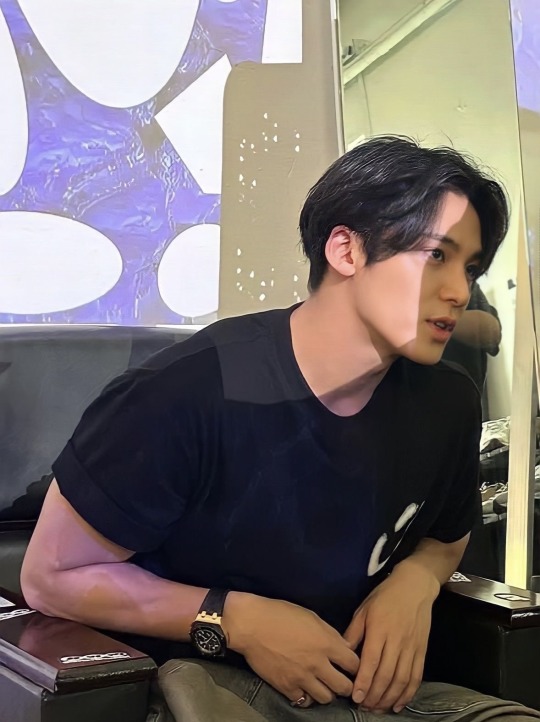
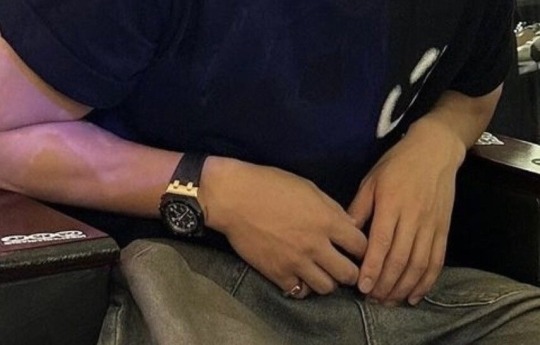
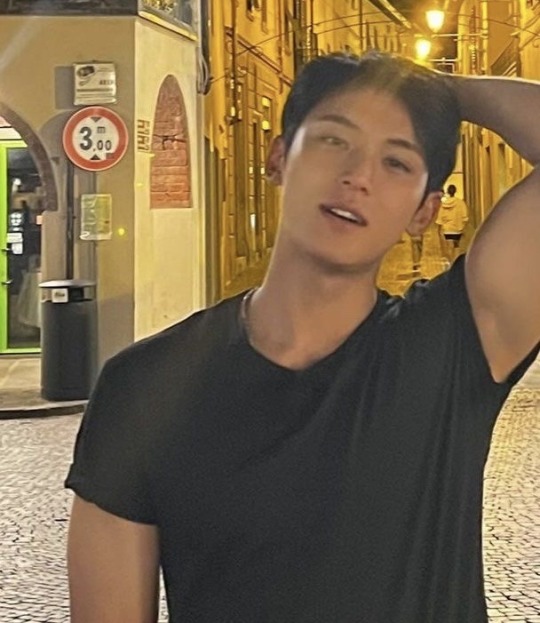
The bright glow of the screen illuminated Y/N’s face as she sat between Jeonghan and Mingyu for their live broadcast. The chat was scrolling at an incredible speed, filled with fans’ enthusiastic comments and playful demands. The energy in the room was light and fun, as it always was when the three of them got together.
“Hyung, they’re asking us to arm wrestle,” Mingyu read aloud, a grin tugging at his lips.
Jeonghan scoffed, flipping his hair dramatically. “Do they really think I can beat you? Look at these arms, and look at mine.” He waved his hand in dismissal but still leaned forward to place his elbow on the table. “Alright, let’s do it for the fans.”
Mingyu smirked, flexing his arm slightly before locking hands with Jeonghan. The moment their match began, it was clear who would win. Jeonghan put up a fight for a few seconds, his face scrunching in fake effort before dramatically letting Mingyu slam his arm down.
“Aish, so strong,” Jeonghan whined, shaking his hand out. “I should’ve let Y/N do it instead.”
Mingyu chuckled, wiping imaginary sweat from his forehead. “You didn’t stand a chance.”
The fans in the comments exploded with new messages.
*Let Y/N and Mingyu arm wrestle! *Y/N vs. Mingyu, let’s go! *We need to see the size difference!!
Jeonghan noticed the comments and smirked. “Oh, now this is interesting. Y/N, what do you think?”
Y/N glanced at Mingyu, who was already looking at her with a playful glint in his eyes. “You really want to arm wrestle me?” she asked, raising a brow.
Mingyu laughed. “I mean… if the fans want it, who am I to say no?”
She sighed dramatically. “Fine.”
As she placed her elbow on the table, Mingyu reached out to take her hand—and that’s when he paused, his lips parting slightly in surprise. He let out a small chuckle, turning his hand slightly to look at the difference in size between theirs.
“Wait, hold on.” Mingyu pulled back slightly, laughing again as he studied her hand in his. “Your hand is so small.”
Y/N frowned in embarrassment. “It’s not that small.”
Mingyu grinned, lifting his other hand and offering his thumb. “Here, try grabbing my thumb.”
Curious, Y/N wrapped her fingers around his thumb, and they both stared at how perfectly it fit in her grip. Even the fans in the comments were reacting in real time.
*OMG HER HAND FITS AROUND HIS THUMB?! *This is the cutest thing I’ve ever seen. *HOW IS THIS REAL?
“Okay, what about this?” Mingyu extended his index finger toward her. Y/N hesitated before wrapping her fingers around it—and once again, his finger was noticeably longer than her entire palm.
Mingyu chuckled, shaking his head in amusement. “That’s… actually adorable.”
Jeonghan smirked at him. “Mingyu, are you calling Y/N adorable on live?”
Mingyu’s eyes widened slightly before he quickly corrected himself. “I mean—uh—I meant her hand! Her hand is adorable.”
The chat exploded again.
*DID HE JUST CALL HER CUTE?! *THE WAY HE PANICKED LMAOO *Bro, just admit it already.
Jeonghan, ever the instigator, waved his hands dramatically. “Guys, let’s be real. Mingyu is 186 cm, and Y/N is, what, 152 cm? Of course there’s going to be a huge size difference.”
Mingyu nodded, relieved to shift the attention away from his slip-up. “Exactly! That’s all it is.”
Still, the teasing in Jeonghan’s eyes didn’t go unnoticed by Y/N. She felt her heart race a little at the way Mingyu had looked at her—like he was genuinely fascinated by their difference in size.
After the live ended, Jeonghan stretched and let out a loud yawn. “Well, I’m off to bed. Don’t stay up too late, you two.” He winked at them before disappearing into his room.
Mingyu lingered in the doorway of Y/N’s room as she scrolled through her phone, reading the fans’ reactions.
“They’re going crazy over the hand thing,” she mumbled with a small laugh.
Mingyu smiled, stepping inside. “Well, can you blame them? It was kinda funny.”
Y/N hesitated for a moment before taking a deep breath, summoning all her courage. “Mingyu… do you really think I’m cute?”
Mingyu blinked, caught off guard by her sudden question. He hadn’t expected her to be so direct. But after a brief moment, he nodded. “Yeah, I do.”
Y/N’s cheeks flushed slightly, and before she could react, Mingyu reached for her hand again. He held it gently in his own, turning it over as if he were still amazed by how small it was compared to his.
“You have really soft hands,” he murmured, tracing a finger lightly over her palm. “Like cotton.”
She quickly covered her face with her hands, feeling the heat rush to her cheeks. “Mingyu, stop…”
He chuckled, reaching up to gently pull her hands away. “Don’t hide,” he said softly, his fingertips grazing her skin. His palm cupped her cheek, and he brushed his thumb lightly across it.
For a moment, neither of them said anything. The air between them was charged with something unspoken, something that made Y/N’s heart race.
Mingyu’s gaze flickered to her lips for a second before he smiled, shaking his head slightly. “You really are cute, you know that?”
Y/N swallowed, her voice barely above a whisper. “You keep saying that…”
He grinned. “Because it’s true.”
The warmth of his hand on her cheek lingered as he slowly pulled away. Y/N felt her heart pounding against her ribs, but at the same time, she couldn’t help but smile.
#seventeen#seventeen x reader#seventeen x y/n#svt fanfic#svt x reader#svt x y/n#seventeen fanfic#seventeen imagines#svt fluff#svt imagines#seventeen fluff#seventeen 14th member#14th member of seventeen#mingyu fluff#mingyu x reader#mingyu x you#mingyu x y/n#mingyu fanfic#svt mingyu#seventeen mingyu#kim mingyu#seventeen mingyu x reader#seventeen mingyu fluff#mingyu seventeen#mingyu
535 notes
·
View notes
Note
May I request some house finches? I have recently become overjoyed that a pair of them have chosen our porch light as a nesting spot (on the side of the house we don't use so they shouldn't be disturbed thankfully!) - we've spent a lot of years with non-native birds being dominant in the area and the abundance of native finches this spring is making me happy.
Our male was so red that until I heard him sing I thought he was a purple finch, so I have high hopes for the health of their chicks!
Why yes of course!

House Finch (Haemorhous mexicanus), male, family Fringillidae, order Passeriformes, NC, USA
photograph by Martina Nordstrand

House Finch (Haemorhous mexicanus), male, family Fringillidae, order Passeriformes, OH, USA
photograph by Matthew Plante

What’s the difference?: House Finch vs. Purple Finch
https://www.reconnectwithnature.org/news-events/the-buzz/difference-between-house-finch-vs-purple-finch
284 notes
·
View notes
Note
I shifted and manifested with your Morphics challenge !!!!!
I am sharing this on an alternate account because I don’t feel comfortable posting on my main account. I want to continue using my main account so, I hope that’s okay.
I’ve been in the LOA community for a while and have consumed every piece of information. You know how it is.. I had a Reddit and TikTok shifting account and was literally helping people shift with my advice. But aside from maybe slightly hearing or seeing my DR, I had never succeeded, and even that was years ago.
I’ve gotten lazier yet more somehow ambitious since 2020 when I first started this journey, which is insane because you know how when you first find out about shifting, you have a lot of symptoms and almost do it, but then months and years pass, and you’re more desperate yet doing the same useless things. It was like that. I was enlightened; I could spew every method to you backwards, studied many years from teachers like Neville Goddard, Joseph Murphy, Florence Scovel Shinn, Wayne Dyer, Earl Nightingale, Louise Hay, Esther Hicks (Abraham-Hicks), Albert Einstein, Thomas Edison, Ralph Waldo Emerson, Wallace D. Wattles, Rhonda Byrne—okay, everyone and their teachers. I also spent so much money on paid subliminals, meditations, teacher personal subscriptions, witch spells, lucid dreaming supplements, etc., but there are some things money can’t buy, so really, don’t waste your money lol.
I’m not here to be wise and do nothing with that wisdom, so I realized maybe instead of trying to do everything so mighty and intricate and be pretentious in my intelligence, let me try something so simple I would be shocked if it worked. Then I came across a post that was like, "Everyone is going to shift in September," and I almost cried because I have been trying for almost 5 years. I’ve given everything, and I was starting to think LOA is a cult because, let’s be real, it checks off all the things of a cult:
1. Charismatic Leaders: Many LOA teachings are popularized by charismatic figures who attract devoted followings, similar to leaders in cults.
2. Promised Benefits: LOA often promises significant personal benefits, like wealth and happiness, which can be enticing and lead to strong adherence.
3. Community and Belonging: Followers of LOA often form tight-knit communities, sharing experiences and supporting each other, which can resemble the communal aspect of cults.
4. Us vs. Them Mentality: Some LOA teachings might create a divide between "believers" and "non-believers," fostering an exclusive mindset.
5. Simplistic Solutions: The idea that simply thinking positively can solve complex life issues might be seen as an oversimplification, similar to some cult ideologies.
It’s almost religious, but most people are religious, and you know what? Without faith in something, people might have probably just (TW) killed themselves. Everyone has some kind of cult behavior—religious, politics, loyalty to family who don’t love or respect them. At this point, if it was a cult, I guess I was okay with that. Hopefully, the belief would at least give some sort of false comfort. Because having awareness and enlightenment and still suffering is even worse. Ignorance is bliss, as they say.
Then I came across your challenge, and tbh I had tried every subliminal, meditation, binaural beat, etc., so at first, I thought, how will this be any different? But then I saw the LOA Bella success story, and I just felt this was my calling because I had never related to a success story so much. I wanted to cry because it felt like a sign.
This isn’t a very exciting or good story, but all I did was:
Morning
https://youtu.be/gOpZAPo8VvU?si=FA2oxWQkR6l2KU_M
During the day (together)
https://youtu.be/67T-wX2iqfM?si=-f-TvsYyQ_D-od1L
https://youtu.be/xwaSBZFucGg?si=8-XLLROuoIypBSu0
Overnight
https://youtu.be/uBHMmHbQwa0?si=h01rp0Ngdl7Xhv9C
Basically I had a lucid dream and woke up in my waiting room because I had used lucid dreams to get into the void state, but they were also fake voids, and it was annoying to think, "Wow, I’m going to wake up with my dream life," and then fail. So I was taking no chances. I had a dream I was at work, and this lazy girl was being lazy as usual but an actual nuisance. We were outside, and I was like, "Wait, I don’t work outside," and then I got too excited, so I started jumping around and did a backflip because I heard that helps stabilize the dream. Then I commanded my annoying coworker to take me to a portal, and she did. I envisioned my waiting room and set the intention that when I close my eyes and enter the portal, I would wake up in my WR. I walked through, and then I fell. I was scared to open my eyes, so I affirmed just in case as I fell, and I heard the beach waves, and I knew it was there.
I only did this for manifesting purposes because then I intended to shift back to the same reality but where I had my dream life and master shifting abilities and void ability.
Honestly, I was so depressed at that point I didn’t particularly have any dreams or aspirations, so I didn’t know what would make me happy, as sad as it sounds. But I just slid into my WR bed and set the intention because I knew anything is possible in my WR and fell asleep. When I woke up, I woke up in a brand new house with a brand new family in a beautiful room.
Now, like I said, I didn’t have any intentions, so for the last few days, I’ve been having so many surprises and things happening that I now realize, of course, I would want this. I am just very happy, and I can’t believe it was so easy after almost 4 years.
I don’t have any stupid enlightenment advice that I would have thought I would have when I finally succeeded. As stupid and cult-like as it sounds, don’t give up—something will click.
That's amazing! I'm so happy for you and your success :)) and I am even more happy that you’ve found happiness when you don’t even know what you wantedand that it worked out.
I had a very similar experience and what I took from this is to be open to experimenting with different methods because what might not work today could be the key tomorrow and it can seem random.
I wish you the best with your dream life and I hope you continue to find happiness in different ways
855 notes
·
View notes
Text
'Premiere' vs. 'preview'
When you are an absolute charlatan, but still want to look sophisticated and use Google Translate to prove your point.
There is some furious gloating across the street about C finally 'confirming' Tony McGill attended the London premiere, despite her clearly stating the contrary in that BBC Four interview. Source allegedly being this interview for the French weekly women's magazine Marie-Claire:
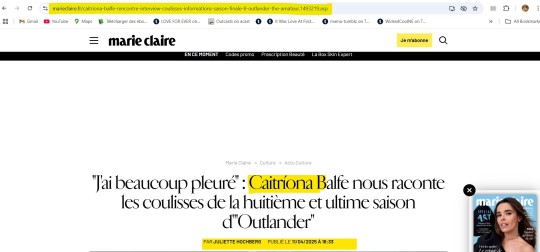
[Source: https://www.marieclaire.fr/caitriona-balfe-rencontre-interview-coulisses-informations-saison-finale-8-outlander-the-amateur,1493219.asp - 11 April 2025]
Except... she never said what BIF's non existent knowledge of French, offered as a legit translation and sarcastically commented upon:
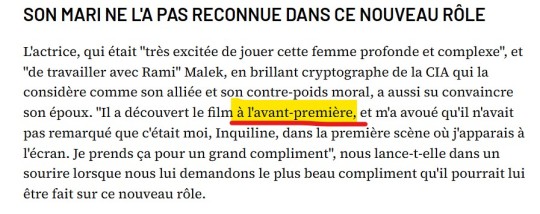
I will translate, if you allow me:
'Her husband did not recognize her in this new role
The actress, who was 'very excited to play this deep and complex woman' and 'to work with Rami' Malek, who plays a brilliant CIA cryptographer who considers her as his ally and his moral counterpart, was also able to persuade her own husband. 'He discovered the movie at the preview screening and he confessed he did not notice it was me, Inquiline, in the first scene where I hit the screen. I take that as a great compliment', she quips with a smile, when we ask her what is the most beautiful compliment she ever got for this new role''
So she did not lie to BBC Four's Nuala McGovern, because an 'avant-première' is just a false friend in French, Google Translate is not really able to recognize as such. It means:
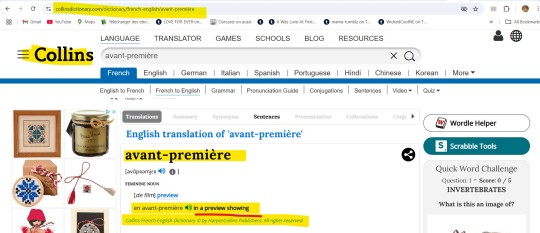
[Source: https://www.collinsdictionary.com/dictionary/french-english/avant-premi%C3%A8re]
It means 'preview showing/screening'. Not premiere, hence the 'avant-' prefix: it means 'before' in French.
Avant-première. Before the premiere. -> Peel your eyes on this and eat crow, darling
Something we know happened on March 30, 2025. Not the next day, when @asilookedupatthestars-blog-blog thought, in all good faith, she saw McGill in front of the Leicester Square cinema:

[Source: https://www.gettyimages.com/detail/news-photo/caitr%C3%ADona-balfe-and-laurence-fishburne-attend-a-special-news-photo/2207642520?adppopup=true]
As for the 'compliment', well, well, well (ROFLMAO) ...
As far as I know, Inquiline looks like this in that movie, and consistently so:
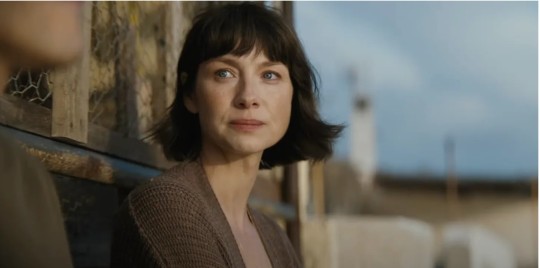
[Source: https://uk.news.yahoo.com/exclusive-caitr-ona-balfe-reveals-111200469.html?]
You can't say there is a stark difference from real life C, like for example...
Count László de Almásy before the accident...
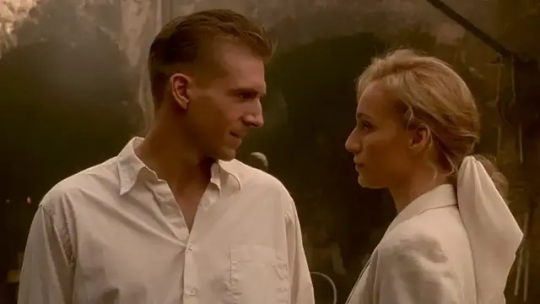
and...
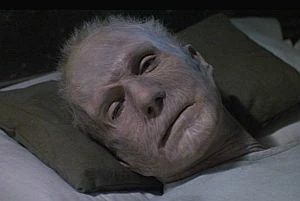
...Count László de Almásy after the accident. Yes, The English Patient, one of my top 5 movies ever. I am a huge fan of Ralph Fiennes and yet, I did not recognize him, when the first scene he appears in that movie hit the screen.
But I never met Ralph Fiennes in real life, only his Doppelgänger of sorts (a.k.a Someone). The very Someone who, believe me, I would immediately recognize on the Maracanã stadium filled to the brim. For obvious reasons, mind you, and despite anything else.
So yeah, I never met Fiennes in real life, let alone pretended I was married to him. Apparently not a joy, either - but hey, stick to the work, not the person, right?
Color me confused. 'The husband' doesn't see her enough? Is she that forgettable? Or is it such an OTT (fabricated?) compliment, that can easily backfire? And in my book, it did.
Because it is important for Caitriona Mary Balfe to be perceived as a 'serious actress' in France. For many, many reasons. But yes, France - it just had to be there and believe me, I bet people in the know probably had a good laugh at what can ironically be construed as her endearing, sentimental clumsiness.
But the most important thing is still this one: a French 'avant-première' is never an English 'premiere'.
And that makes all the difference between a superficial idiot and all the rest.
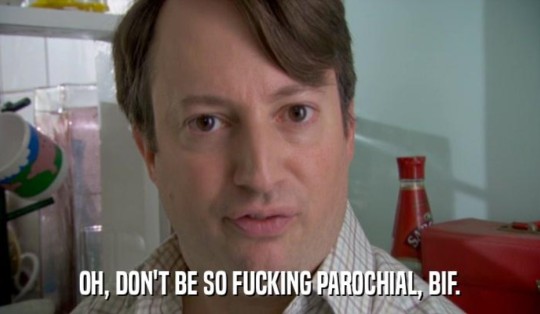
148 notes
·
View notes
Text
Tamil Linguistics thread (bc nobody cares but me)
but really, if you are interested in linguistics at all, give this post a read, because this shit really blew my mind ...
have been reading the following paper: https://ccat.sas.upenn.edu/~haroldfs/public/h_sch_9a.pdf
"The Tamil Case System" (2003) written by Harold F. Schiffman, Professor Emeritus of Dravidian Linguistics and Culture, University of Pennsylvania
Tamil is one of the oldest continuously-spoken languages in the world, dating back to at least 500 BCE, with nearly 80 million native speakers in South India and elsewhere, and possessed of several interesting characteristics:
a non-Indo-European language family (the Dravidian languages, which include other languages in South India - Malayalam being the most closely related major language - and one in Pakistan)
through the above, speculative ties to the Indus Valley Civilization, one of the first major human civilizations (you can read more about that here)
an agglutinative language, similar to German and others (so while German has Unabhängigkeitserklärungen, and Finnish has istahtaisinkohankaan, in Tamil you can say pōkamuṭiyātavarkaḷukkāka - "for the sake of those who cannot go")
an exclusively head-final language, like Japanese - the main element of a sentence always coming at the end.
a high degree of diglossia between its spoken variant (ST) and formal/literary variant (LT)
cool retroflex consonants (including the retroflex plosives ʈ and ɖ) and a variety of liquid consonants (three L's, two R's)
and a complex case system, similar to Latin, Finnish, or Russian. German has 4 cases, Russian has at least 6, Latin has 6-7, Finnish has 15, and Tamil has... well, that's the focus of Dr. Schiffman's paper.
per most scholars, Tamil has 7-8 cases - coincidentally the same number as Sanskrit. The French wikipedia page for "Tamoul" has 7:
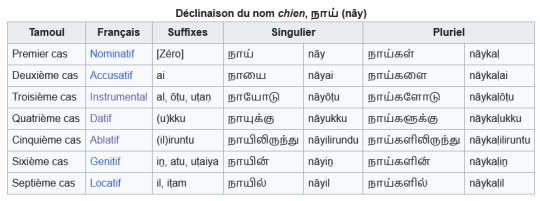
Dr. Schiffman quotes another scholar (Arden 1942) giving 8 cases for modern LT, as in common in "native and missionary grammars", i.e. those written by native Tamil speakers or Christian missionaries. It's the list from above, plus the Vocative case (which is used to address people, think of the KJV Bible's O ye of little faith! for an English vocative)
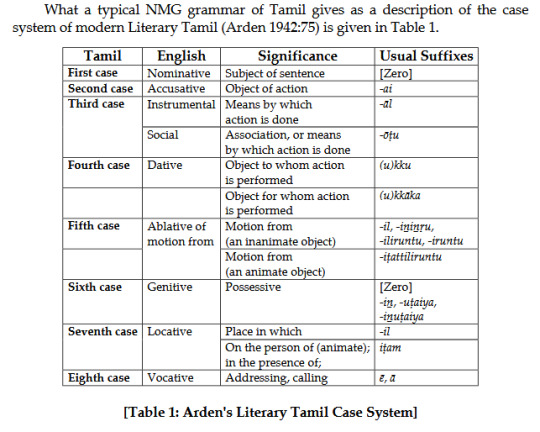
... but hold on, the English wiki for "Tamil grammar" has 10 cases:
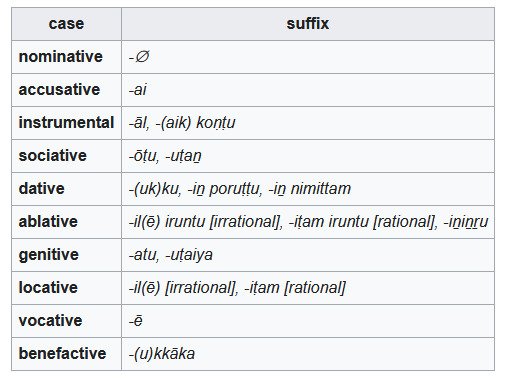
OK, so each page adds a few more. But hold on, why are there multiple suffix entries for each case? Why would you use -otu vs. -utan, or -il vs -ininru vs -ilirintu? How many cases are there actually?
Dr. Schiffman explains why it isn't that easy:
The problem with such a rigid classification is that it fails in a number of important ways ... it is neither an accurate description of the number and shape of the morphemes involved in the system, nor of the syntactic behavior of those morphemes ... It is based on an assumption that there is a clear and unerring way to distinguish between case and postpositional morphemes in the language, when in fact there is no clear distinction.
In other words, Tamil being an agglutinative language, you can stick a bunch of different sounds onto the end of a word, each shifting the meaning, and there is no clear way to call some of those sounds "cases" and other sounds "postpositions".
Schiffman asserts that this system of 7-8 cases was originally developed for Sanskrit (the literary language of North Indian civilizations, of similar antiquity to Tamil, and the liturgical language of Vedic Hinduism) but then tacked onto Tamil post-facto, despite the languages being from completely different families with different grammars.

Schiffman goes through a variety of examples of the incoherence of this model, one of my favorites quoted from Arden 1942 again:

There is no rule as to which ending should be used ... Westerners are apt to use the wrong one. There are no rules but you can still break the rules. Make it make sense!!
Instead of sticking to this system of 7-8 cases which fails the slightest scrutiny, Dr. Schiffman instead proposes that we throw out the whole system and consider every single postposition in the language as a potential case ending:
Having made the claim that there is no clear cut distinction between case and postpositions in Tamil except for the criterion of bound vs. unbound morphology, we are forced to examine all the postpositions as possible candidates for membership in the system. Actually this is probably going too far in the other direction ... since then almost any verb in the language can be advanced to candidacy as a postposition. [!!]
What Schiffman does next is really cool, from a language nerd point of view. He sorts through the various postpositions of the language, and for each area of divergence, uses his understanding of LT and ST to attempt to describe what shades of meaning are being connoted by each suffix. I wouldn't blame you for skipping through this but it is pretty interesting to see him try to figure out the rules behind something that (eg. per Arden 1942) has "no rule".


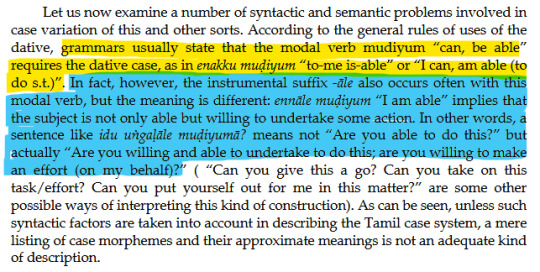
On the "extended dative", which connotates something like "on the behalf of" or "for the sake of":
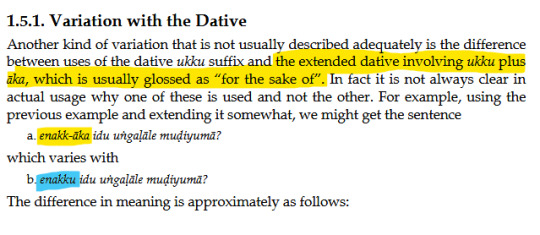

I especially find his analysis of the suffix -kitte fascinating, because Schiffman uncovers a potential case ending in Spoken Tamil that connotes something about the directness or indirectness of an action, separate from the politeness with which the person is speaking to their interlocutor.

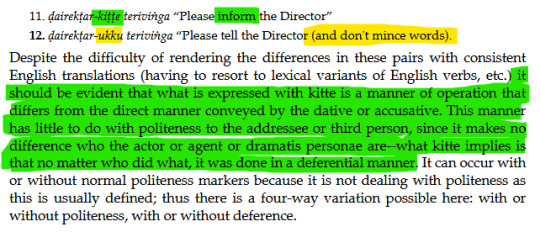
Not to blather on but here's a direct comparison with Finnish, which as stated earlier has 15 cases and not the 7-8 commonly stated of Tamil:
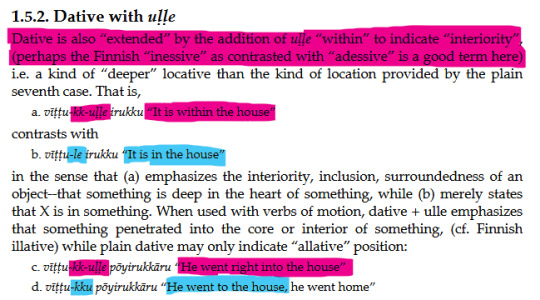
What Schiffman seems to have discovered is that ST, and LT too for that matter, has used existing case endings and in some cases seemingly invented new ones to connote shades of meaning that are lost by the conventional scholar's understanding of Tamil cases. And rather than land on a specific number of cases, he instead says the following, which I find a fascinating concept:
The Tamil Case System is a kind of continuum or polarity, with the “true” case-like morphemes found at one end of the continuum, with less case-like but still bound morphemes next, followed by the commonly recognized postpositions, then finally nominal and verbal expressions that are synonymous with postpositions but not usually recognized as such at the other extreme. This results in a kind of “dendritic” system, with most, but not all, 8 of the basic case nodes capable of being extended in various directions, sometimes overlapping with others, to produce a thicket of branches. The overlap, of course, results from the fact that some postpositions can occur after more than one case, usually with a slight difference in meaning, so that an either-or taxonomy simply does not capture the whole picture.
How many cases does Tamil have? As many as its speakers want, I guess.
175 notes
·
View notes
Text
Follow me to the rabbit hole of the Anuradha Nakshaktra 🕳️ 🐇 🐾

I got inspired by Anuradha threads from Talia🦋 (@Astrotalaya) & @opalblade blade on tumblr
I found helpful posts from different sources I linked them below so you guys can check them out they’re awesome.

Anuradha diety is Mithra god of sun & is the god of friendship.
Anuradha is ruled by Mars & Saturn. Mars is known for survival, aggression, action and courage like a warrior.
Saturn represents discipline, obstacles, lessons and time.

The director of Si-Fi movie “Lucy“, has Jupiter in Anuradha. “Lucy” is played by Scarlet Johansson she’s a Anuradha sun, she’s a Anuradha asc like @opalblade mentions on her post & Claire Nakti.
The lyrics remind me of Mitra as they mention the sun and I also found out Miley Cyrus who is also a Anuradha sun did a cover to this song :)
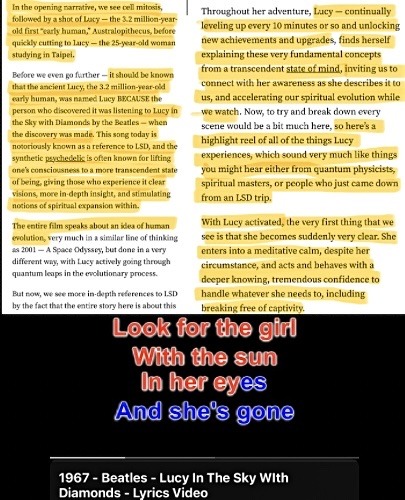
The article noted that the song is a known reference to LSD. They mention Lucy experience sounds like someone coming down from a LSD trip. It made me recall the Anuradha theme of Alice in the wonderland. Alice follows the rabbit to the rabbit hole. (Anuradha animal yoni is a Hare bigger than a rabbit but similar.) Alice consumes a mysterious cake that has side effects for example making her really tall. The article states in the end “Alice enters the twenty-first century, there’s no sign of her influence abating. She seems to be everywhere at once” Similar to Lucy.
https://x.com/tia_visagie/status/1833259302406209752?s=46
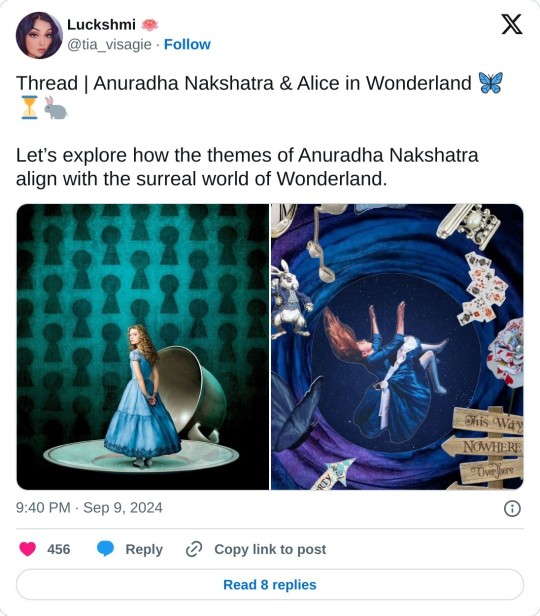
^ She explained the connection between Anuradha and Saturn in detail.
This article “The Hidden Spirituality of Lucy” explained the movie very well and its connection with the evolution of species and human consciousness.
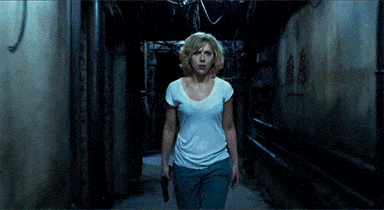
In the beginning of the movie they show clips of animals in the wild, prey vs predator describing the situation Lucy would find herself in. After witnessing her boyfriend being shot dead, she is captured and forced to become a drug mule. Anuradha is a Scorpio Nak the rasi is mars. Lucy was led to intense situations, in need of perseverance and survival instincts. One bag of the CPH drug is sewn into her abdomen for transport to Europe. However, she is kicked in the stomach, breaking the bag and releasing a large quantity of the drug into her system. Lucy’s cells began a process of mutation transmuting her physical and mental capabilities, with time she reached higher levels of consciousness going from 10%-100%. What came in mind was a Saturn quote “With great power, comes great responsibility.” Lucy acquires enhanced physical and mental capabilities, such as telekinesis, telepathy, and mental time travel. Lucy negated her emotions. She was able to regenerate and use the drug to transform herself even her looks.

Themes of phoenix,regeneration, accession & deccession like Talia explains in her posts.
Lucy needed advice on what to do with all the knowledge she has. She asks Professor Norman he tells her she should share her knowledge & ignorance is worse than not sharing it. “The whole purpose of life has been to pass on what we learned, and there is no higher purpose.” When’s Lucy said, “I don’t feel pain, fear, desire, it’s like all things that make us humans fade away, it’s like the less human I feel all this knowledge about everything,quantum physics applied mathematics the infinite capacity of a cells nucleus.” Reminded me about how Ketu feels more comfortable in Scorpio because Ketu is linked with detachment/seperatin & letting go. This article below explains what Ketu is associated with they mention ”Ketu is often associated with the concept of moksha or liberation from the cycle of birth and death. It is believed that a strong Ketu placement can lead a person towards spiritual liberation and ultimate freedom.“ Some astrologers say Ketu exalts in Scorpio because Scorpio is about deep, intense/extreme situations & letting go, surrendering and things related to spirituality. Lucy also says we never really die throughout the movie.
Lucy says in the movie “Every cell knows and talks to every other cell. ”They exchange a thousand bits of information between them per second. Cells group together forming a giant web of communication, which in turn, forms matter.”
https://x.com/maxdemlan/status/1860000754859487578?s=46
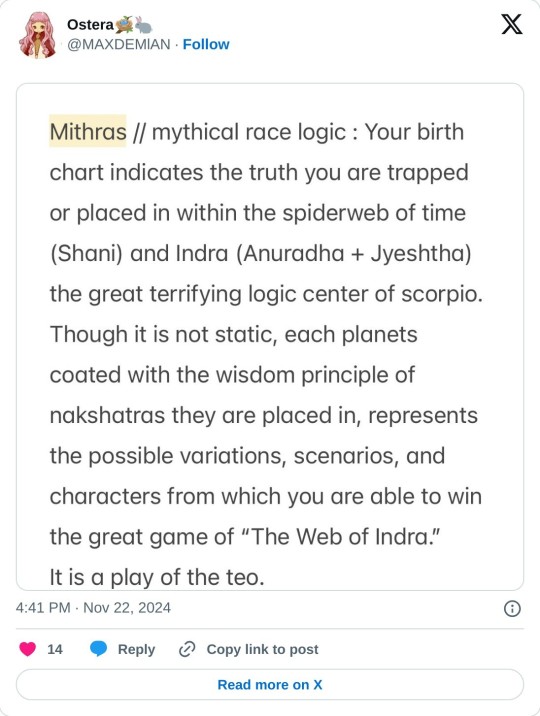
youtube
Lucy mentions “web of time” & “without time we don’t exist” ,“time is unity” it coincides with Anuradha for its devotion and it being the star of friendship with Saturn being a co ruler of Anuradha along with mars, Saturn rules time. Lucy obtained a venom spider abilities Anuradha has a connection with spiders.
Clairnakti made a post about the actors who play Spider-Man & the girls from Madem Web have Anuradha placements.
The article “Lucy: An Underrated Summer Blockbuster Overflowing With Brains & Complexity” said Lucy is like Spider-Man “Like Spider-Man after the iconic spider bite, Lucy is reborn within her old skin—privately transformed into a fully-embodied mutant. “
youtube
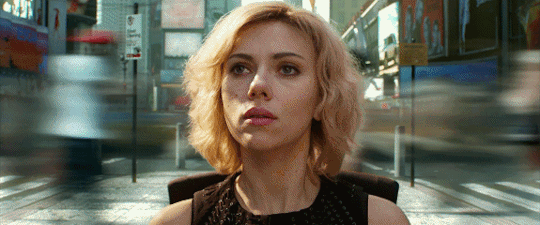
Lucy was dragged to a place she didn’t want to be in but ended up attaining higher consciousness. Themes of (descension & ascension like Talia mentions).
A symbol for Anuradha is the Lotus flower. 🪷 Lotus flowers can’t grow without the mud they need the mud in order to grow. The lotus has a connection to the Ajna chakra the third eye, the movie theme was her activating her mind / consciousness.

^The thread is also very interesting.
instagram
Anuradha has a connection with kundalini in his post he states, “Once the kundalini rises from the Muladhara, it seeks to leave out the body through the crown, resulting in Sahasrar’s Petals unfolding like a flower ready to receive the Light.” “Sahasrar is named the “Thousand Petalled Lotus” because there are theoretically a thousand Petals, each connected to with countless minor Nadis or energy channels that carry Pranic energy from different areas of the Body of Light that terminate in the head area.”
Talia also posted that Anuradha constellation looks like a serpent.
Claire Nakti also has made an article about this Nak she explains that Anuradha can ”understand the secrets behind scriptures, that are written in code..”
Lucy mentally begins a spacetime journey into the past, eventually reaching one of the oldest discovered ancestor of mankind, Del Rio asks Norman where Lucy is, immediately after which Del Rio's cell phone sounds and he sees a text message: "I am everywhere." Lucy's voice is heard stating "Life was given to us a billion years ago. Now you know what to do with it."

Lucy was able to evolve to her highest potential of her existence in the movie. This relates to Anuradha themes of accession, transforming & evolving. Going through the tough situations & ego death, Lucy was able to bloom admists challenging situations she had a powerful determination like the lotus flower.🪷🪷
Lucy 2 is in the works right now I’m excited I’m hoping it’s just as good as the 1st one.
Hope you guys enjoyed🐰
115 notes
·
View notes
Text
Top 5 Differences Between Western and Vedic Astrology: A Quick and Dirty Guide
5. Zodiac Signs: Who's Who in the Sky?
Western: Tropical zodiac, based on the seasons.
Vedic: Sidereal zodiac, based on the actual constellations.
Think of it like this: In Western astrology, you might be a Sagittarius. In Vedic, you could be a Scorpio or even a Libra, depending on when you were born.
4. Planet Power: The Cosmic Players
Western: Sun and Moon are the big players.
Vedic: All planets are important, especially Jupiter, Saturn, and Mars.
Vedic astrology is like a cosmic game of tag, with every planet influencing your life in different ways.
3. Moon vs. Sun: The Inner Self
Western: Sun represents your ego and conscious self.
Vedic: Moon represents your emotions and unconscious mind.
Imagine the Moon as your secret diary, revealing your deepest feelings and desires.
2. Future vs. Past: Predicting Your Fate
Western: More focused on interpreting your personality and potential.
Vedic: More predictive, often making specific forecasts.
Vedic astrology is like a cosmic fortune cookie, offering glimpses into your future.
1. Destiny vs. Free Will: Fate or Choice?
Western: Emphasizes free will and personal choice.
Vedic: More fatalistic, believing in destiny and karma.
Vedic astrology is a game of chess, where your moves are influenced by a higher power.
Follow our Facebook page Mage Magic Touch for personal consultations https://www.facebook.com/profile.php?id=61565561190268
#astrology#astro community#astrology observations#astro notes#astrology facts#astrologer#astrology signs#astrology readings
162 notes
·
View notes
Text
Mike and Wills friendship vs everybody elses
I’m sick of people acting like Mike and Wills friendship is platonic when 1. One literally had a crush on the other and 2. None of the other friendships are treated the same way Mike and Will are throughout the seasons so let’s go over them!
(This is gonna be a long one!)
Season 2 & 1
First off, in season 1, the show focuses on how Will going missing effects Mike the most out of all his friends. Mike is the only one to notice Will isn’t at school the day he goes missing. Mike is the one to come up with the idea to go out looking for him. Mike only keeps El around when he realizes she can help find Will. Mike is the only one that’s focused on after they find Will’s “dead” body. Mike is the only one out of the party members that holds proper hope that Will may still be alive.


In season 2 he was the only one that went outside of the arcade to check where Will had gone. He was the only one that noticed Will was being extra quiet that day at school. He panicked when he couldn’t find Will, “Will what’s wrong? I couldn’t find you, are you hurt? I’m gonna get you home, okay? I’m gonna get you home”, He purposely volunteered himself to go check on Will and then proceed to stay with Will in the hospital for days afterwards. He was the only one out of his friends that stayed with Will in the shed when he was possessed.
Edit: also wanted to point out how in the crazy together scene when Will told Mike about the mindflayer he said “just please don’t tell the others okay? They wouldn’t understand.” Implying that Will trusts Mike the most and that he thinks only Mike would understand what he’s going through.
& Will only yelled Mike’s name when he was having an episode before the crazy together scene happened. He didn’t yell Lucas’s name or Dustin’s or even Jonathan or his mums, his first instinct was to call Mike for help. Both of these things furthermore prove my point that their friendship is different from the others and they’re much closer


Again, the show focuses on Will and Mikes friendship the most this season. Not their friendships with Lucas or Dustin or anybody else, just with eachother. None of the other friendships in the show have done anything like this. Hell none of the friendships in the show ever GET as much attention and focus as Mike and Will do throughout the seasons. They are treated so differently. Still don’t believe me?
Season 3
One of the most iconic Byler scenes is the rain fight scene. Now I'm not really gonna talk about how obviously romantic this scene is by itself. But how it contrasts Will and Lucas's apology scene. The contrast between these two scenes is such a huge piece of evidence to me and I'm surpsired I don't see it around more
(Thank you to this video for saving me while I was trying to find the scenes https://youtu.be/u-rLx10eROw?si=vdGoQNtnXU103iZt )
Here’s the two scenes mixed together for reference:
Byler’s fight
In the Byler scene, it has buildup. Will getting mad and then bursting out of the room, Mike follows him while Lucas stays behind. Once they get outside, the lighting is dark and blue. The music playing in the background is somber. The way both characters talk and act makes you know that this is a serious scene. The aftermaths of Will going to his house and crying as he destroys castle Byers. And Mike and Lucas biking out to find him in the rain. You could make the argument that Lucas being there makes this scene bad proof, but it focusing more on Mike then Lucas tells you otherwise.
Lucas’s apology
It’s super rushed, you barely even notice it. It’s super random and isn’t focused on at all, it just starts with Lucas saying he’s sorry and Will saying it doesn’t matter and it’s pretty much over. The lighting is bright, our minds are more focused on trying to get ready to trap Billy then the actual conversation they’re having. Neither Lucas or Will react to it afterwards. You could literally skip this scene and you wouldn’t miss anything.
So why have such a useless scene in the middle of nowhere?
The Byler rain fight is such an important scene to show how Mike and Wills friendship has gone downhill, to show the change between children and teenagers, and also to hint at Will's sexuality. The Lucas and Will scene is just so useless and random and could've been left out, but the way it contrasts the Byler fight scene makes me think that its only purpose was to show the difference between Mike and Wills friendship together vs anybody else's, and nothing else. Because why else have it there? If Mike and Wills scene wasn't meant to have a deeper meaning, then why make it as dramatic as it was? Why build it up the way they did?? If it was platonic the scene would've been more similar to the Lucas scene and/or toned down a LOT.
It's undeniable that the Duffers where trying to show us something with these two scenes
Season 4
You can tell there’s clearly tension between Mike and Will when they reunite in the airport, which is very odd. Mike and Will are best friends, and again, Mike wouldn’t act this way with any of his other friends. He didn’t even act this way with El

Mike then later admits that he was being an asshole to Will, and we get that beautiful “friends. Best friends.” Scene.
Now, I want you to rewatch that scene and pretend that Will is Max or Lucas or Dustin or Erica or Steve or Jonathan or anybody Mike is friends with. But you can’t. It just feels too wrong and too romantic, doesn’t it? It seems weird as well, because we know full well Mike wouldn’t say something like that to any of his other friends. He’s never had a conversation like that with any of his other friends, either. This is because they’re just that. Friends. So why should it be any different for Will and Mike?
This is the same for any scene with Mike and Will. Season 4 or not


And if you seriously cannot notice the difference between Mike and Wills friendship vs anybody else’s, you need to do a rewatch
Anyways, there’s probably more stuff I could add but I’m gonna leave it at that for now. If you have anything to add leave it in the comments! Thank you for reading
#I had to rewrite this like 10 times cause Ive been in the car all day and ny internets shit and my tumblr kept fucking crashing on me#I did it though#stranger things#stranger things 5#Byler#Byler nation#Byler theory#Byler proof#byler is canon#byler endgame#byler is real#how many Byler tags can I fit into this#mike wheeler#Will Byers#miwi#gay#anti Mileven#Mileven bones#platonic mileven#mileven is bones
271 notes
·
View notes
Note
https://www.tumblr.com/rq-lif3styl3s/752949689078431744/bahhahahagaggag
Yeah okay, I've got juice in the tank for this one.
So, for anyone who doesn't wanna click links from anons, this is a link to a post about "transracial" and "trans-abled" people. Specifically, this post is arguig that transracial and transabled people Are Valid.
I mostly see people dismiss these ideas as obviously wrong and shitty rather than actually engaging with them, and like, fair. But I have the energy right now, so fuck it. Let's learn!
The thesis of this post is "gender, race, and ability are all basically the same, so being trans-gender/racial/abled is all the same." I think this demonstrates a fundamental lack of understanding of all of these concepts, and frankly, I think this is a deeply incurious way of thinking.
This person clearly has at least a surface-level understanding of transgender theory, and they've gone ahead and applied that understanding to everything else without doing any deeper thinking or learning. That sucks. Gender, race, and dis/ability status are all very much social constructs on which systems of oppression are based, but these are social constructs with very different histories and frameworks.
For example: pretty much every culture has had some concept of "gender"- most of them resembling the "male/female" binary we're familiar with today- since time immemorial. Gender roles are fluid with time and culture, and trans identities (and even culturally-sanctioned gender roles/terms) have also been present as long as gender itself has. Gender in various cultures has not always been a construct on which systems of oppression are based, nor is that system of oppression always a patriarchy.
"Race", by contrast, is a concept that sprung up in the 17th century as a justification for colonization and slavery.
Another example: "Disability" is a more modern term, mostly referring to a system of power and one's position in it. There have always been disabled people, but they haven't always been thought of as disabled, and a lot of things we consider "disabilities" in our present culture weren't always thought of as disabling (i.e. pathologized). A lot of things that are disabling are also not thought of as "real disabilities", and a lot of people who are disabled don't think of themselves- and thus are not thought of- as "disabled". It's fluid in a very different way than gender is fluid.
Racial identity is also fluid for very different reasons than the others: a lot of the reasons someone might experience fluidity in their racial identity have to do with their context, and their individual relationship to white supremacist power and oppression.
I don't think there's anything wrong with acknowledging or exploring the overlap between these things; I personally am super interested in the overlap between cissexism and ableism, and I've explored it a lot in the last couple of years of schooling! Medicalization and pathologization, medical needs and gatekeeping, the understanding of bodies as "natural" and "pure" vs. "unnatural" and "disfigured"- it's all fascinating.
But learning more reveals a lot of differences between gender and transgender folks- things that are entangled with power, but do and have existed separate of power- versus race and disability, which describe relationships to systems of power on a very fundamental level.
It's a mistake to ignore the differences like this, and it reveals more ignorance than anything. Learn about the histories, complexities, studied frameworks, and lived experiences of trans people, disabled people, and people of color! Learn about what makes us similar, and what makes us different! Learn about the issues unique to each of us, and the conversations we're having about theory and systems of oppression!
I'm here for the inclusive mindset, and also, like, there's a reason people treat these things differently. Please learn.
175 notes
·
View notes
Note
heyo got any tips on writing gangs?
Writing Gangsters
Organized Crime vs. Gangs
Although the terms are used interchangeably, there's a difference between organized criminal networks and gangs.
Organized crimes have focuses on material gain and therefore has a more hierarchical leadership structure.
The activities of gangs are usually more fragmented, opportunistic and based on individual contacts, more entangled with the personal lives of its members.
Of course, if a street gang become powerful enough, large enough and resourceful enough, it comes a full-blown criminal organization.
Background: Time, Place, Economic Condition
Research into the characteristics of the time and place where your gang is.
Oftentimes, gangs form when the economic conditions of a country/region is down. People, especially those who are marginalized, are disillusioned which can lead them to make desperate choices.
It's important to note that many gangs are formed initally to serve as the "police" in a neighborhood where no police would enter because (for some reason) they feel as if there's nothing they can do.
Gangs may start with a "good" reason, but it just so happens that eventually they become the very thing they sought to get rid of.
Compelling Character Motivation
With the socio-geographical context as backdrop, give your characters a clear reason why they would join and stay in a gang.
A young teen may join a gang out of pure whim, maybe for money, but eventually it's going to have to be more than that.
Idolization - an older sibling is in the gang
Inclusion - connection with others is so wanted due to a lack of it in a dysfunctional family
Stability - feeling secure in a neighborhood where gangs seems like a viable option; if a gang is already terrorizing the area, joining it may seem like a way to protect one's family
Financial security - jobs may seem out of reach; it si high risk and high rewards but your character may be that desperate
Ambition/thirst for power/revenge
+ Yes, someone may join the gang because they don't want to work a regular job and want quick money, but I wouldn't say they are lazy. From what I understand, gangs require work...
A developmental Model of Gang Membership (use for character arc):
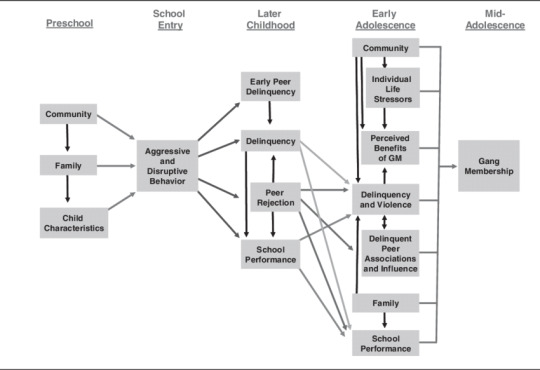
Research:
National Gang Center FAQ: https://nationalgangcenter.ojp.gov/about/faq#0-0
Gang Life Insider Article: https://amuedge.com/the-various-dangers-of-gang-life-an-insiders-perspective/
NY Gang Slag: https://nypost.com/2012/10/28/a-to-z-deadly-slang-by-gangs-of-new-york/
Gangster Short Stories you can Read Online
‘Johnny Mnemonic’ by William Gibson
‘Vice Grip’ by Matthew A. Goodwin
‘Dolan’s Cadillac’ by Stephen King
#writers block#writing#creative writing#creative writers#helping writers#let's write#poets and writers#writers on tumblr#writeblr#resources for writers#writers and poets#writerscommunity#writing inspiration#writing prompt#writing advice#on writing#writing tips#writing community#writer stuff#writer#writer on tumblr#writer community#writer things#writer problems#writers of tumblr#writers community#writers life#gangs#character#character writing
299 notes
·
View notes
Text
Why Lena doesn’t figure out Kara is Supergirl - psychoanalysis
A psychological reason for which Lena doesn’t realize Kara is Supergirl is that when faced with two similar objects the human mind likes to categorize and therefore looks for differences over similarities, especially when similarities are obvious.
Theory
Consider this thought exercise, imagine two groups of similar looking people but with completely different biology. It would probably make sense that as an observer you would try to find the smallest differences between these two groups in order to be able to tell them apart. It happens often in the world, it is part of the human developmental psychology. It helps infants be able to tell apart similar faces, and it perfects in time based on expertise through synaptic pruning.
In other words it is what makes bird enthusiasts able to figure out which birds are female or male in the same species. Or how car enthusiasts are able to tell apart similar cars. If you’re interested look up the FFA (fusiform face area) and it’s role as visual the expertise module, there are many neuro scientific studies on it.
This categorization becomes increasingly clear when the sense of me vs them in social psychology comes into play.
Lena’s Case
Now applying the same theory to Supergirl TV. Oftentimes we hear Lex’s emphasis on how kryptonians look like humans and how they are actually different from them. Us vs Them. Would it be plausible to believe that Lena growing up in the Luthor household, bearing a scientific mind would be rather inclined to look for dissimilarities rather than similarities between supergirl and other humans? Please consider her first invention in National City, the alien detector device. A little device designed to highlight these dissimilarities, coded by Lena herself. She is a scientist her expertise lies (also) in telling humans apart from aliens, biologically, not visually.
Taking it a step further. Would it be plausible that when faced with Kara and Supergirl, two people similar in so many ways (driven, ethical, stubborn, blonde, blue eyes) that she would overlook the similarities and try to find the slightest of differences in order to latch on to some small sense of security by categorizing Supergirl as “the other”.


(I could also expand on how Kara explains that Supergirl is what she can do and not who she is, further emphasizing my point on obvious emphasis on biological “otherness” over appearance) yada yada but i won’t :))
It does all boil down to cognitive dissonance and Lena’s will to overlook the similarities if we were to simplify it all. But I just thought it would do the story some justice if I could explain how neuropsychology supports that these simple disguises are more effective than one might think.
Im such a nerd, pls forgive my rant. I have a link to the study i’m referencing :) I am nothing if not thorough :)
https://www.sciencedirect.com/topics/neuroscience/fusiform-face-area#:~:text=Several%20functional%20neuroimaging%20studies%20have,configurations%20(Kanwisher%2C%202000).
#supergirl cw#supergirl#lena luthor#supercorp#katie mcgrath#kara x lena#supercorp fanfic#i ship it#glasses#kara danvers#kara zor el
81 notes
·
View notes
Text
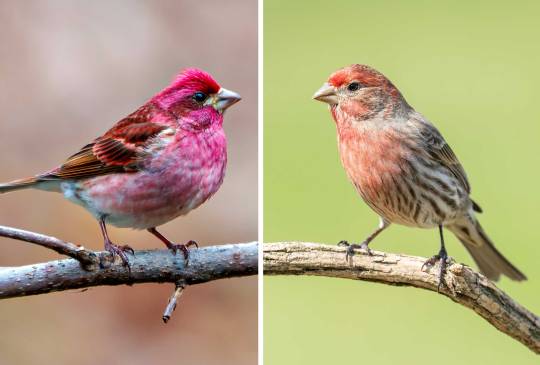
What's the difference?: House Finch vs. Purple Finch
House finches and purple finches, in particular, can cause a lot of confusion because they do, in fact, look quite similar. There are some key ID features that will help you tell these birds apart, but the calendar is actually the best place to start. That's because house finches can be found here in northern Illinois year-round, but the purple finch is migratory and only spends winters in our area. Purple finches breed in the forests of Canada and then migrate to much of the eastern United States in the winter, according to the Cornell Lab of Ornithology (Opens in a new window)...
Read more: https://www.reconnectwithnature.org/news-events/the-buzz/difference-between-house-finch-vs-purple-finch
187 notes
·
View notes
Note
https://scitechdaily.com/dogs-can-talk-study-confirms-dogs-intentionally-use-soundboards-to-communicate/
Saw this and wondered about your thoughts on it. I remember reading awhile back your post(s) about it and Clever Hans and everything.
I haven't read the study myself yet, so I don't have opinions/information beyond that.
I personally don't think this study proves button dogs are doing anything new or surprising or beyond Clever Hans-like behaviors.
First off, the study is self-reported and the sample size is not very large, meaning that the dogs are not in a laboratory environment where we can be sure they are getting the same type of instruction and that anything that might lean the study towards Clever Hans effect is mitigated (we even have to try to purposefully mitigate Clever Hans effect in Human behavioral studies btw).
Clever Hans effect is not imitation, much in the way the study describes that dogs are not imitating their owners. It's not like the horse was imitating his handler stomping at the ground, the horse who was known as Clever Hans used his knowledge of human body language to anticipate the correct answer and would stop pawing at the ground when this body language was achieved. A big part of "Clever Hans Effect" is the fact that this body language, by the humans involved, is not consciously done. We all display things unconsciously from a body language perspective and domestic mammals like dogs and horses, who have been bred to work alongside humans for a very long time, are excellent at decoding this. The horse didn't understand math in the same way these button dogs in all likely hood only understand that the combination of these particular sounds give them something they desire. I can ask my dog to sit and they'll get a treat, which is rewarding. So the next time they hear "sit" they are anticipating a reward and performing the behavior that produces the reward. They do not understand the word "sit" in the context of the English language. I can change that word to any human language or any word I want and they'll still perform the behavior as long as that sound (+potential hand signal) + reward is associated with the behavior on a consistent basis.
The study goes on to say that the dogs can string two-word combinations together to communicate. It's well known that dogs can be taught quite a few words and combinations of words/commands even without buttons, so this is not surprising (my dogs know that Gee (turn right) is different from Gee Over (get to the right side of the trail for example).
The study observes that most button communication from dogs dealt with essential needs such as "outside" + "potty" or "outside" + "play". These are already needs and desires that dogs (attempt to) communicate with their owners on a daily basis, the only difference between somebody relying on buttons for this communication vs somebody who is not is that a majority of pet owners are not well versed in dog body language and may be ignorant of or misinterpret what their dog is trying to communicate. I personally think there is a huge problem with expecting dogs to communicate in a distinctly human-like way that has not been proven to be more accurate than basic commands + body language while us as humans might place little or no value in the communication styles of dogs themselves.
What the study does not do is prove that button using dogs are describing dreams, emotions, or anything beyond their immediate needs. These concepts are peddled heavily by the most popular animal button communication influences such as Hunger for Words and Bunny the Dog, etc. It is THIS aspect peddled by dog button people that irks me the most (in addition to some of the ableist language towards non speaking people these people have pushed..) because it is simply not true that their dogs can describe dreams they had or how the dog feels about their new baby. It is not scientifically proven. Button for potty? Cool, I love that if it works for you. I don't need a button like that for my dogs because I understand their body language differences between outside + potty and outside + play, but I know some people might need a tool like this for clarity or ease. Buttons to describe dreams and desires beyond a dog's immediate needs? I'm suspicious and comparing you to Koko the Gorilla's handler who did the same thing (non-scientific attributing of emotions given to the animal they care for in a non-accurate way).
The study says it would love to find out if they can attribute button use to dreams, complex emotions, past & future events, etc. But how can you possibly, in good faith, know you're being accurate with this when we cannot even guarantee an absence of Clever Hans Effect in human behavior studies? When we have not even been able to identify these things in a non-button study? How do you identify if it is happening correctly within button using dogs if you can't identify if it is happening within normal dog behavior?
and finally, the study lists four individuals associated with the study and NONE of them are animal behaviorists or have backgrounds in DOG cognition and behavior. One of those four people is associated with the brand of buttons used. This alone flaws the study enough for me to discount it.
#dogblr#dog behavior#button dogs#clever hans#faq#i just think these kind of studies are BORING also lol#like i don't need three human behavior people to tell me dogs can string words together#ive known that for YEARS because that's what dog behaviorists have been saying for DECADES
71 notes
·
View notes